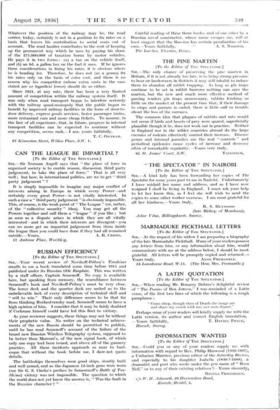RUSSIAN EFFICIENCY
[To the Editor of THE SPECTATOR.]
Sin,—Your recent review 'of Novikoff-Priboy's Tsushima recalls to me a book translated some time before 1911 and published under its Russian title Rasplata. This was written by a staff officer, Captain Semenoff. No copy is available here, but speaking from inemory, the resemblance between Semenoff's book and Novikoff-Priboy's must be very close. The lower deck and the quarter deck are united as to the unbelievable lack of every description of technical skill and " will to win." Their only difference seems to be that far from thinking Rozhestvensky mad, Semenoff seems to have a high opinion of him. I consider that it may be fairly doubted if. Cochrane himself could have led this fleet to victory.
As your reviewer suggests, these things may not be without their prophetic value. No writer on the technical achieve- ments of the new Russia should be permitted to publish, until he has read Semenoff's account of the failure of the brand new Russian Wireless TelegraphY system, supposed to be better than 'Marconi's, of. the new signal book, of which only one copy had been issued, and above all of the gunnery practice. All these incidents approach so near to burl- esque that without the book before me, I dare not quote
details. -
. The battleships themselves were good ships, stoutly built and well armed, and as the Japanese 12-inch guns were worn (see Sir G. S. Clarice's preface to Semerenoff's Battle of Tsu- Shi ma) victory was not impossible. The question 'to which the world.does• not yet know the answer is, " Was the fault in
the Russian character ? "- • •,. Careful reading of these three books, and of one other by a Russian naval constructor, whose name escapes me, will at least suggest that the Russian has certain peculiarities of his own.—Yours faithfully, • ,• The Larches, Tiverton, Devon.
• A. S. NAIMOLI.






































 Previous page
Previous page